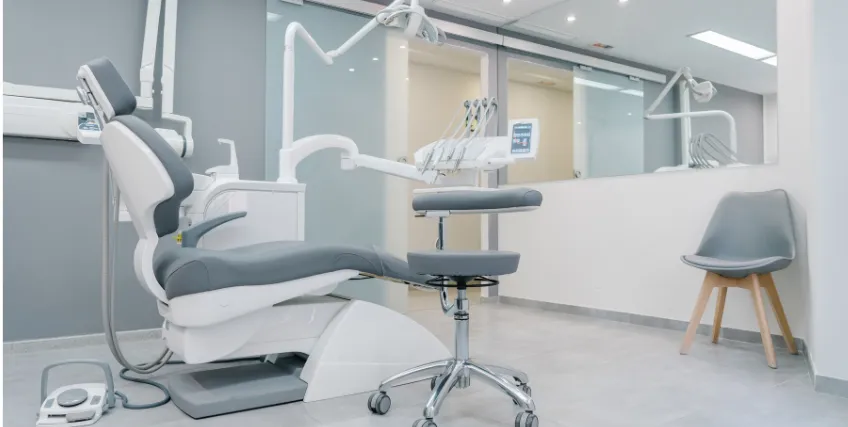How Your Credit Score Affects Dental Work Loans Rate, and How to Improve It
October 06, 2025 | Last Updated on: October 06, 2025

A strong credit score not only helps determine eligibility for dental work loans but also has a dramatic impact on the rate a borrower will pay and the loan terms they can secure.
Improving a credit score can unlock better, lower-cost options, making it much easier to afford major dental procedures.
This article provides an in-depth exploration of how credit affects dental work loan rates, offers concrete strategies to improve your standing, and provides guidance for navigating the application process with confidence.
Understanding Dental Work Loans and Credit Score Impact
Dental work loans help patients or families finance dental treatments such as implants, orthodontics, crowns, surgery, and even cosmetic treatments when upfront payment is challenging.
Practitioners, banks, and specialized lenders offer these dental work loans with terms largely dependent on creditworthiness. The higher the score, the lower the risk for the lender, and the more competitive the interest rate and repayment terms are.
Borrowers with good credit can effortlessly secure dental work loans with APRs. Poor credit means less availability, often at higher interest rates, and even outright denial from mainstream lenders.
How Lenders Assess Credit for Dental Financing
Lenders primarily use your credit score for dental financing as a quick reference when reviewing an application. The thorough review process typically offers health financing, but there are no guarantees dental work loans approval.
Minimums for traditional financing options will vary around 650, although some specialized lenders will consider scores as low as 540-560 if you have other compensating factors, such as consistent employment or a co-signer.
The full credit score is considered, along with factors such as credit history, debt-to-income ratio, job stability, and the ability to service existing debt. The actual interest rate on dental work loan costs for dental work is directly related to all of these factors.
Individuals with a score of 700 or higher, considered “good” to “excellent,” may have vastly lower rates and more options, as well as fewer limits. Borrowers with lower scores, commonly referred to as subprime borrowers, will incur significantly higher costs and shorter terms. This is one of the reasons that making improvements to your credit score before applying can make such a big difference.
The True Cost of Dental Work and Why Financing Matters
Even simple dental procedures can cost thousands of dollars, and dental implants, orthodontia, or full mouth reconstructions can run into the tens of thousands of dollars. Dental insurance typically only covers a small portion of many procedures, especially those involving cosmetic and specialty dental work, leaving patients needing dental work loans to help offset the cost.
The costs of dental work can refer not only to the dentist’s treatment plan cost but also to materials, lab fees, additional surgery associated with the implant, any preparatory work (such as bone grafts or extractions), and may also involve sedating the patient and a consultation with a specialist.
For many, one of the most reasonable ways to access quality dental care or achieve a significant improvement in their oral healthcare is to break down the total dental expense into monthly payments.
How Your Credit Score Determines the Rate
The FICO of a borrower is the foundation for all consumer lending today. Scores are typically grouped in ranges:
- Excellent (720+): Eligible for best terms and rates, most likely with little or no fee, and the option to repay flexibly.
- Good (680–719): Still decent rates, less in the way of benefits, some additional screening.
- Fair (640–679): Higher interest is typical, and fewer lenders are available.
- Poor (less than 640): Many are left with significantly higher rates and charges.
Even a change from "fair" to "good" will cut estimated interest rates in half, saving potentially thousands of dollars over the life of a multi-year dental work loan.
Application Process: What to Expect and How to Prepare
When you are seeking dental credit, you should be ready to present your employment history, pay stubs, total monthly debts, existing credit limits, and identity verification.
The dental care credit application almost always has some kind of credit inquiry, either a "soft" or "pre-qualify" inquiry that does not affect your score, or, finally, a "hard" inquiry that may drop your score by just a few points.
A reputable provider will allow a prospective borrower to check their eligibility with either a soft inquiry or, at the very least, a pre-qualification of the dental work loan amount and interest rate. As a best dental practice, try to utilize the soft inquiry prior to a formal application to see if you are likely to qualify and at what rate.
Some lenders or even Dental Office-affiliated lenders may allow a co-signer to help, especially for patients with marginal credit.
Secondary Approval Factors in Dental Loan Decisions
Lenders don't just look at the raw number of credits. A high, verifiable income, little existing debt, and a confirmed history of timely payment enhance your chances of approval and lower rates. Even with a lower score, evidence of regular, steady employment and few other debts can work in your favor.
Likewise, maintaining a low cost debt-to-income ratio is also essential. Your debt-to-income ratio can be calculated by dividing your gross monthly debt payments by your gross monthly income, a factor all lenders give considerable weight to.
Loans for Dental Work: Where to Find the Top Rates
All dental work loans are not made equal. The best loans for dental work typically come from trusted banks, credit unions, or online private lenders and are often available directly through the dental provider's network.
"Pre-qualified" offers can help borrowers shop for real rate quotes with no obligations and are worth exploring. Some lenders that specialize in medical loan offers longer terms and lower APRs to patients with excellent credit, while others accept somewhat fair or average credit but still charge relatively high-interest rates.
Even working with a dental office can achieve some surprisingly great results; clinics sometimes offer specialized financing arrangements or short promotional periods, providing additional time with no interest for qualified patients.
How to Improve Your Credit Score Before Applying
Begin by obtaining your free credit reports from all three major credit bureaus and reviewing them carefully for errors or outdated information. Dispute any discrepancies right away; simply correcting errors can increase your score by 20+ points.
Second, pay down your credit card debt to reduce your utilization ratio when seeking dental work loans. It is recommended to have utilization of less than 30% of the limit, with less than 10% being ideal. Pay all monthly payments on time because missed payments or late payments badly hurt your score and remain on your report for as long as seven years. A push-button payment plan is a good idea at this juncture.
If your whole universe of active credit accounts is already maxed to capacity, even small payments to reduce the balances can create score gains in a few months. Becoming an authorized user on a trustworthy relative's old, responsibly held account also earns a minus factor, adding to your credit history and mix, even if you never use the card.
If credit is particularly tight, consider obtaining a secured credit card and using it properly. Avoid closing previous accounts to maintain the age of your credit history, and refrain from applying for multiple new dental work loans or cards simultaneously, as each "hard inquiry" will negatively impact your score.
Additional Strategies to Boost Approval Odds
Timing is crucial. If possible, develop your score over a period of three to six months before seeking funding. During this period, you should also begin gathering documentation, such as current tax returns and pay stubs, as well as proof of your residence.
If your score does not reach the target level, arranging for a trusted co-signer to accompany you on the dental work loans (if that is an option) could improve your chances of approval and substantially reduce the dental work loan rate offered.
Dentists understand that credit issues may be temporary and still want to work with patients to help them achieve or maintain their oral health, such as through teeth whitening, root canals, fillings, tooth extractions, or wisdom tooth removal. Call the dentist’s office directly. Some offices have patient advocacy programs, or they may be able to offer financing and help options that do not rely strictly on a single credit report.
Key Takeaways for Successful Dental Financing
Choosing the right lender and product for dental treatment takes time and a measured approach. Begin by confirming and improving your credit score, gathering all pertinent data, and applying pre-qualification tools to obtain relative interest rates. Review thoroughly all dental work loan agreements, promotional rate periods, grace periods, and prepayment penalties prior to signing a contract.
Finally, remember that the environment is competitive, with numerous lenders offering a wide range of options for patients across all credit levels. By being proactive with your economic well-being, understanding what affects your cost of borrowing, and planning effectively, nearly all patients can obtain successful, affordable, and well-planned dental surgery loans.
This comprehensive view enables individuals and families to apply for dental credit with confidence, Acquiring essential and discretionary dental care without the fear of exclusionary upfront costs. Seeking the finest dental work loans or simply to proceed with ease through the application process for dental care credit, attention to these credit-building steps can alter the course of care, making a brighter, healthier smile a reasonable expectation for everyone.
FAQs About Dental Work Loans
Does dentist finance affect credit score?
Applicant financing only involves a soft credit score check, so your credit rating won't be affected if your application is unsuccessful.
How does credit score affect your loan interest rates?
Your credit rating is calculated based on your credit report. If you have a higher credit rating, you generally have a better credit history and are more likely to qualify for a lower interest rate.
What is the ideal credit card for dental work?
The ideal credit card for dental care is based on your financial needs and the price of your procedure, but CareCredit is a health card with promotional, usually interest-free, terms for dental treatments at a large number of provider locations. For general-purpose use, consider using a credit card with a 0% intro APR to take advantage of interest-free terms. However, be sure to review the terms and conditions to avoid retroactive interest or high standard APRs.
What's the quickest way to improve credit score?
In order to improve your credit score most quickly, you can immediately reduce your credit utilization ratio by paying down balances, disputing inaccuracies on your credit report, and making sure to pay all of your bills on time, since positive payment history is an important component of your score. It may be possible to quickly improve your credit score by becoming an authorized user on an existing credit card account with someone who practices good credit management, or by requesting a credit limit increase.
Why is my credit score going down when I pay on time?
Your credit score may drop even when paying on time due to a high credit utilization ratio, the permanent closure of a credit account, incorrect information on your credit report, or a decrease in your overall available credit limit. Additionally, paying off an installment loan can temporarily lower your score because it changes your credit mix, and opening several new accounts in a short period can also cause a dip.
Frequent searches leading to this page
Term Loans are made by Itria Ventures LLC or Cross River Bank, Member FDIC. This is not a deposit product. California residents: Itria Ventures LLC is licensed by the Department of Financial Protection and Innovation. Loans are made or arranged pursuant to California Financing Law License # 60DBO-35839




